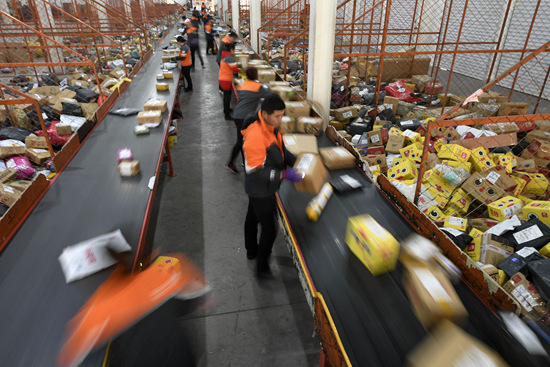
Workers of a courier company are sorting express items. /Xinhua
Workers of a courier company are sorting express items. /Xinhua
During the Double Eleven shopping festival this year, the number of temporary workers employed by major express companies in China has increased by 490,000 to deliver packages faster to users, while their income is relatively low, China Central Television (CCTV) revealed on Saturday.
Where do the large number of temporary workers come from?
How is their income?
What are the overall living conditions of the couriers?
Such questions have become a matter of concern in China.
Major express delivery companies newly add nearly 490,000 temporary workers during Double 11 across the country
At an STO Express delivery center in Hefei city, Anhui province, to cope with the huge cargo brought by the ultra-long version of "Double 11", the staff here have been rotating 24 hours a day over half a month.
"We currently handle about 570,000 to 600,000 packages every day. Our own employees are not able to finish other work. So we recruit some temporary staff to do the extra work, such as placing and arranging goods," Wang Wei, manager of the transfer center, told reporters.
Shen Cheng, a 19-year-old college student, is one of the temporary workers at this transfer point for the night shift.
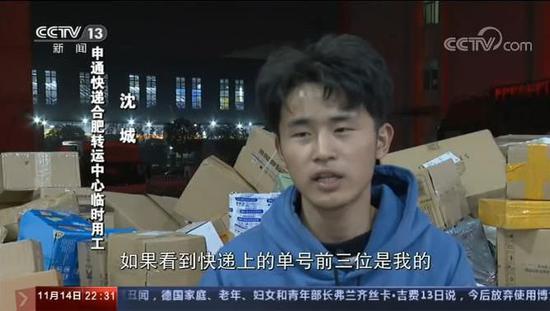
Shen Cheng, a 19-year-old college student, is a temporary worker at Hefei city's transfer point. /CGTN Screenshot
Shen Cheng, a 19-year-old college student, is a temporary worker at Hefei city's transfer point. /CGTN Screenshot
He works 12 hours a day, with an hourly wage of 17 yuan ($2.58), with 50 minutes of rest in between. His main job is to keep staring at the courier number on the track and quickly pick out the packages sent to his area.
"Today, I was responsible for selecting packages delivered to Zhejiang Province. The first three digits of the Zhejiang tracking number are between 320 and 399. When I see these first three digits of the tracking number on the packages, I will take them down and put them on the next track", Shen said.
There are 50 to 60 temporary workers like Shen for night shifts every day in this delivery transfer center, and they can usually get 210 to 230 yuan ($31.87 to $34.90) per night.
The courier earns "less" while doing more
With the advent of Double 11, JD Express deliveryman Pan Yue's dispatching tasks have increased accordingly.
At 05:00 a.m. every day, he starts a day's work. Like more than 3 million couriers in China, his monthly income depends on the number of packages received and delivered that month.
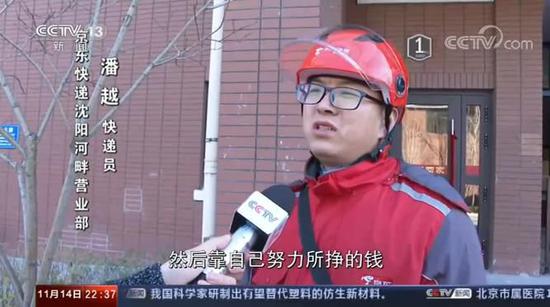
Pan Yue, JD Express deliveryman, accepts an interview by CCTV. /CGTN Screenshot
Pan Yue, JD Express deliveryman, accepts an interview by CCTV. /CGTN Screenshot
Pan told reporters that their monthly wage usually ranges from 3,000 to 10,000 yuan ($455 to $1,517), sometimes even more than 10,000 yuan.
"If you want to make more money, run fast, and send more pieces", he said.
Luckily, Pan works at a directly-operated delivery site, where he can directly sign a labor contract with the express company's headquarters. However, in the current express delivery industry, most sites are operated by franchising, that is, franchised operators contract the basic sites of express companies and then hire couriers and operate independently.
In that case, if the franchise express delivery sites go bankrupt due to poor management, couriers who work at such sites and have not signed a labor contract with the headquarters are usually to face labor disputes and are usually owed part of their wages after the site was shut down.
According to official data, more than 70 percent of express workers in China have a monthly income of less than 5,000 yuan ($758.73).
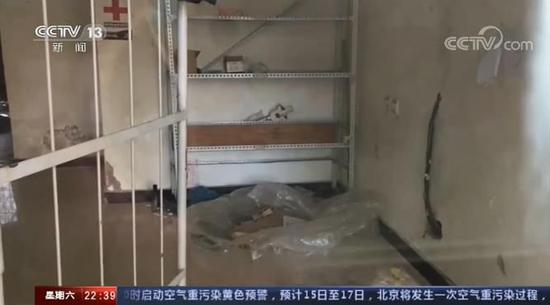
One of the abandoned express franchise sites /CGTN Screenshot
One of the abandoned express franchise sites /CGTN Screenshot
The low-price mode competition in the express industry
Since the cost of express transportation and sorting is difficult to reduce in a short time, reducing labor cost means that wages have become the main means of price wars.
Yiwu city of Zhejiang Province is China's largest distribution center for small commodities, and this year it surpassed Guangzhou to become the country's largest city in express delivery volume.
It has always been a battleground for express companies. The severity of this year's price war is really rare, and the courier fee dropped again and again.
Tang Yifan, a courier from Yiwu's Yunda Express, said that around Double 11, not only the commission for pick-up and package delivery was reduced by half at that time, but the commission for express delivery also dropped significantly.
"In order to retain employees, some courier outlets who did not reduce the courier's wages could only operate at a loss", he added.
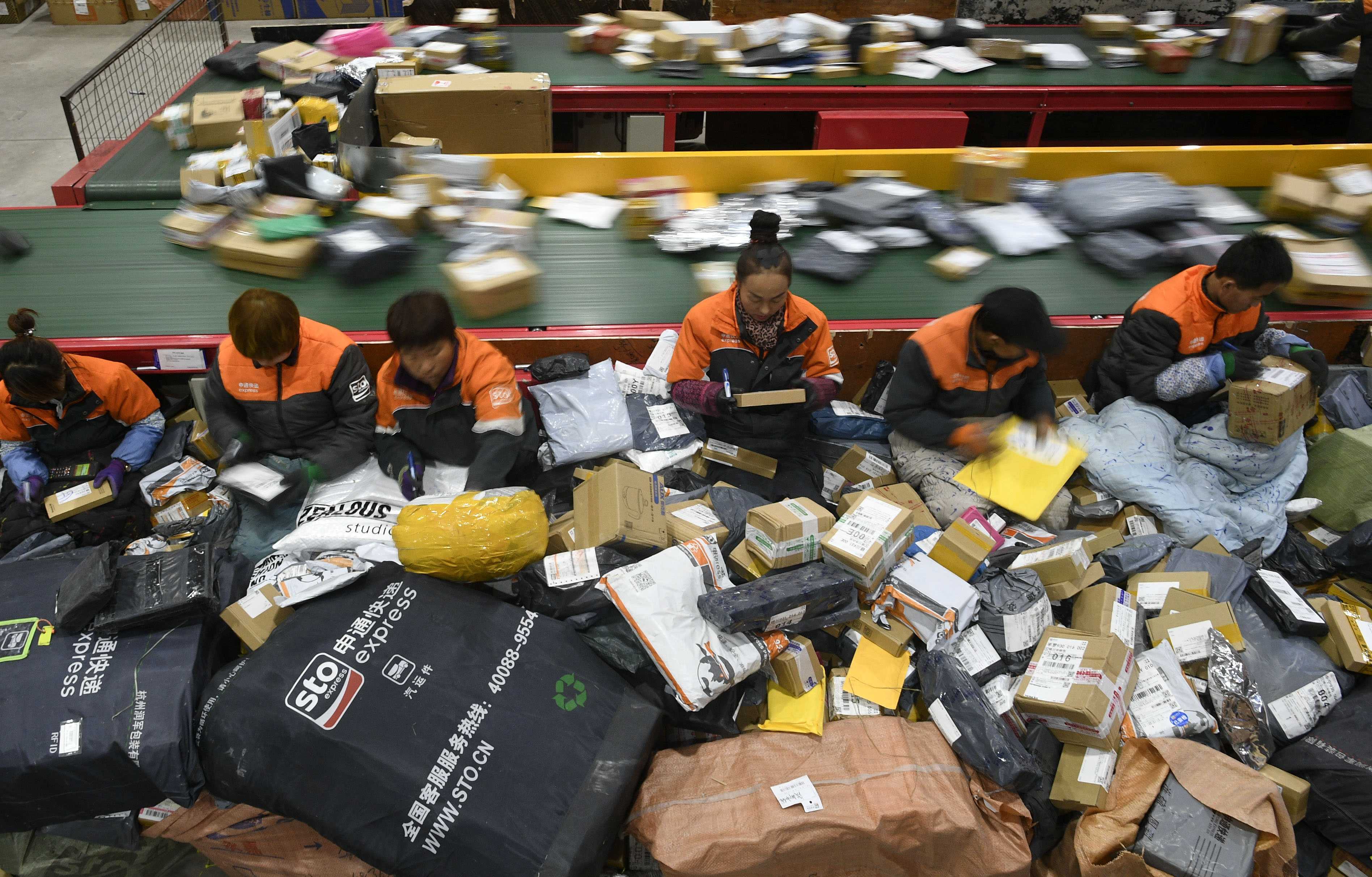
The staff of a courier company is sorting express items. /Xinhua
The staff of a courier company is sorting express items. /Xinhua
Experts' views
Wang Dongsheng, deputy director of the Market Regulation Department of Yiwu Post Administration, said that the price competition in the express delivery industry is not allowed to sacrifice the couriers' interests. Once found, we will stop this behavior, he stated.
"Fortunately, the headquarters of various express companies spontaneously began to adjust and increase distribution fees since July this year," he added.
Yang Daqing, deputy director of the Research Office of the China Federation of Logistics and Purchasing, said: "We need to gradually establish and improve the labor union system, so as to better protect the legitimate rights and interests of migrant workers in the express delivery industry."
He added that China's express service industry is in a critical period of quality improvement. If express delivery companies want to truly capture the market and win word of mouth, the couriers may be the most important group.
"Especially since the epidemic this year, many express deliverymen in the epidemic area still insist on delivering. In fact, they have made a great contribution to this society", Yang highlighted.
Statistics from China's State Post Bureau show that calculated on the basis of nearly 4 million express delivery employees across the country, temporary labor (490,000) has exceeded 10 percent.

